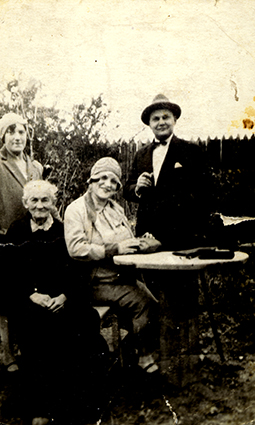Hana-Beila Abramson and her family
To the left sitting is my grandmother Hana-Beila Abramson and the wife of my uncle Abram, Betya, to the right standing is my uncle Abram Abramson. I don’t know the lady on the left. The picture was taken in Kaunas in Uncle Abram’s yard in 1930 shortly before Grandmother's death.
My paternal grandfather, Leizer Abramson, was born in the middle of the 19th century in Kaunas. He was a merchant. He owned a small furniture store in the center of the city. His business was rather lucrative. Grandfather’s family was rich and they had their own house in Kaunas. Grandmother Hana-Beila was eight years younger than him. In accordance with the Jewish tradition she got married at a young age and became a housewife, taking care of their home and raising the children. I remember grandmother Hana-Beila. When the family came back to Lithuania, on holidays she came from Kaunas to Siauliai, where one of her daughters lived. Grandmother seemed very old to me. I remember that she prayed in the mornings. On Fridays she and I lit the candles on the eve of Sabbath. Grandmother didn’t cover her head, but as for the rest she totally looked like a traditional Jewish woman. She died in the early 1930s in Kaunas and was buried at the Jewish cemetery there.
Leizer and Hana-Beila had ten children – four sons and six daughters. All of them got traditional Jewish education. The boys finished cheder, then lyceum. I don’t know anything about the education of the girls. Anyway, the children of Leizer and Hana-Beila were literate people. By the irony of fate none of the daughters had children, and the brothers had two or three children. All of my father’s siblings perished during the Fascist occupation. First Hana-Beila gave birth to daughters. Then the boys were born. The eldest sister Ida, born in the late 1870s, helped her mother raise the younger children, and rejected all her fiancés. Ida remained a spinster. She never worked and lived with grandmother Hana-Beila.
My father was the eldest of the brothers. Then Abram was born in 1890. He was a violinist and worked in the orchestra of the Kaunas opera theater. I don’t recall his wife’s name, but I clearly remember his children’s names. The eldest, Israel, was my age. Before World War II he was a student. The younger Lev and Anna went to a lyceum. Abram’s family perished in Kaunas ghetto during its liquidation in 1944.
